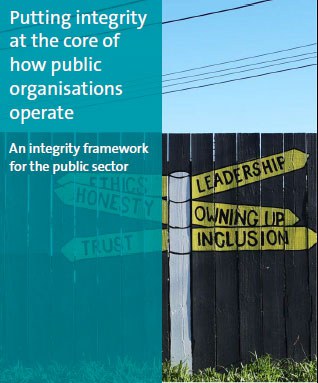About integrity
Please note: There is an updated version of this framework.
What is integrity?
Integrity is a word that is frequently used but often means different things to different people. It can be defined as demonstrating honesty and uncompromising adherence to strong ethical principles. Importantly, it is not just about complying with the law – that is a given. It is about doing the right thing. It is about aligning both your commitment and your behaviour with strong ethical values or principles in a consistent and uncompromising way.
Within te ao Māori, the concepts of tika, pono, and aroha are present in conversations about integrity.10 When considered together, the principles tika, pono, and aroha convey doing the right thing with integrity and love.11
Why integrity matters for public organisations
Integrity helps build and maintain trust and confidence
The public's trust and confidence in public organisations determine their levels of participation with public services and compliance with requirements. This ultimately determines public organisations' ongoing social licence to operate.
Operating with integrity enables services and outcomes to be delivered
To improve outcomes despite the increasing complexity of the issues they are facing, public organisations need New Zealanders to trust them. The public's trust in government is strongly determined by their interactions and experiences with the public services provided. Both the public and an organisation's staff need to see that the organisation is committed to, and regularly demonstrates acting with, integrity.
Integrity helps build meaningful relationships
Communities, iwi, hapū, whānau Māori, families, and individuals who access public services are directly affected by the organisational integrity of the public organisations they engage with. It is important that public organisations demonstrate a genuine commitment to caring for and upholding the dignity and mana of the people they serve.
The more public organisations engage with iwi, hapū, and whānau Māori in a way that displays an understanding of tikanga, the better they will be able to support the Māori-Crown relationship. Enhancing their organisational capability – for example, in building mutually beneficial relationships within te ao Māori and engaging in workforce learning and development – is one way that public organisations can demonstrate their integrity.12
Integrity links to long-term stewardship obligations
Organisational integrity is not just about how an individual acts at a particular point in time, but about the collective actions of an organisation over the long term. Actions in the present are contextualised by an organisation's history and inform the future direction of an organisation. This is particularly important in regard to Māori, who have a relationship with the Crown as a Treaty partner going back more than 180 years.
Stewardship responsibilities require public organisations to actively care for and protect not just their assets but also their long-term capability, people, institutional knowledge and information, systems and processes, and any legislation that they administer.13 And, of course, to care for and protect their relationship with the public they serve.
From individual to organisational integrity
Research on integrity sometimes focuses on an individual – employees complying with a set of common rules and standards. Integrity can also be approached as the promotion of a set of positive shared values.
These shared values do not replace the need for rules. Rather, they give individual staff an additional way of interpreting and applying those rules, and help them properly use their discretion within the bounds of those rules.14
More recent thinking on integrity has centred on organisational integrity.15 Organisational integrity, in the context of the public sector, refers to the collective ethical actions of an organisation to legitimately pursue its purposes for the public good.
The four qualities of organisational integrity are:
- clarity of an organisation's shared purpose;
- the prioritisation of an institution's proper processes alongside its performance;
- an organisation's ability, as well as track record, to keep to its commitments; and
- a robust accountability mechanism to enable the qualities above.
Public organisations with integrity ensure that the actions of their staff, their use of resources, and their spending are consistent with their values, purpose, and duties.
Organisational culture and the "integrity gap"
We know that the culture of an organisation affects the way people behave and the day-to-day decisions they make as they go about their job. Organisational culture is determined by the interaction of systems, norms, and values, all of which influence behaviour.16
Essential to a culture of integrity in an organisation is how safe staff feel about calling out wrongdoing, and how leaders hold themselves and others to account for poor behaviour.
Organisational culture is based on two key components: what is said and what is done. The first part is the desired culture based on the expressed vision, values, and policies and procedures of an organisation. The second is how culture plays out in practice, based on the actual behaviour and attitudes of staff in the organisation. Any difference between the two is known as an "integrity gap".17
10: Mead, Hirini Moko (2016), Tikanga Māori: Living by Māori values (Rev. ed.), Huia Publishers.
11: Stewart, G, Smith, V, Diamond, P, Paul, N, and Hogg, R (2021), "Ko te Tika, ko te Pono, ko te Aroha: Exploring Māori values in the university", Te Kaharoa, Vol. 14, No. 1.
12: See the report (forthcoming) that we commissioned on Māori perspectives on accountability.
13: For example, see s12(1)(e) of the Public Service Act 2020.
14: Kirby, N, and Webbe, S (2019), Being a trusted and respected partner: the APS Integrity Framework.
15: This definition of organisational integrity builds upon the Organisation for Economic Co-operation and Development's thinking on "public integrity" and was adapted from ‘Public institutional integrity' defined, Blavatnik School of Government, University of Oxford.
16: Taylor, Alison (2017), The Five Levels of Ethical Culture (working paper), BSR.
17: Canadian Audit and Accountability Foundation (2021), "Auditing organizational culture in the public sector", Research Highlights.

